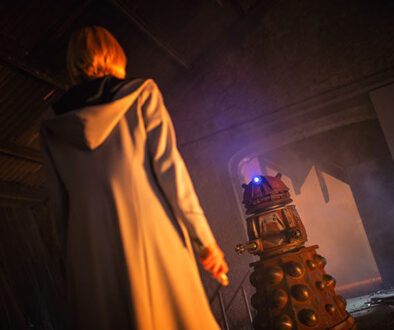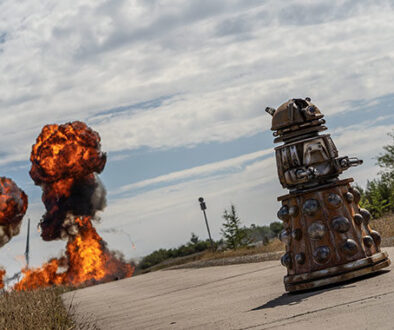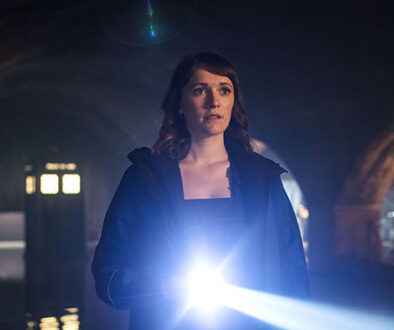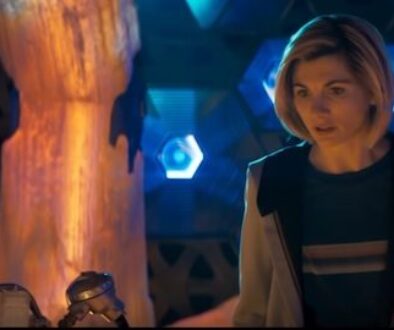2nd Opinion: “Resolution”
Connor Johnston & Gustaff Behr give their takes on the New Year’s special.
Connor’s View – Turning over a new leaf…

Approaching “Resolution”, one might feel a little daunted by the responsibilities the episode’s very nature set for itself. Forgetting for a moment the expectations and scale of a ‘special’ – “Resolution” was also charged with tying up Whittaker’s first series (both thematically and narratively), as well as simultaneously offering enough foresight to look toward the Doctor’s upcoming adventures and maintain the excitement of audiences for a slightly longer, but not unforgivable, off-air period. Beyond all of this, reintroduce the most iconic foe in the show’s history to a new audience, and a new era.
It’s no overstatement to look back on the special post-broadcast, in appreciation of how it both juggled and honoured these responsibilities with such class and such energy, and reflect in awe at what for me may just be the most immersive hour of Whittaker’s era so far. Chibnall’s script, married with Wayne Yip’s stunning direction, radiates sense of adventure that is utterly contagious. Heartfelt and action-packed – “Resolution” almost mirrors episodes like “The Day of the Doctor” in its resemblance to a Hollywood blockbuster. That this feat has been achieved by Yip on a television budget is telling of both his own creativity and the work of the entire production team.
The Daleks are, as mentioned before, one of the most iconic monsters in the show’s long history – but that doesn’t stop them from being plagued by their main weakness: fatigue. Over the years, an oversaturation of Dalek appearances has risked the foe’s reputation. It’s difficult for me to remember a time when the Dalek’s return was cause for as much anticipation and pressure as in this special. Aside from their first confrontation with Whittaker’s Doctor – which was certainly a highlight – it’s the angle the episode takes to narrowing in on a single Dalek, out of the casing for most of the episode, that makes it such an original and memorable appearance for the race. The persistence and hatred it embodies as well as its unyielding hunger for conquest acts to replace the firepower of an entire Dalek fleet to fuel the episode with the very same level of threat – proving that the real strength of the villains isn’t in numbers, but in the concept and ruthlessness of every individual.
Renewal, redemption and new beginnings are all concepts that peak in relevance at New Years. Through Aaron’s inclusion in the episode, Chibnall manages to play to his own character-central strengths in devoting time among battling an imminent threat to continue to develop Ryan’s personal arc of belonging. Thankfully, there’s no questioning the family that’s formed inside the TARDIS, and the relationship that’s formed between Ryan and Graham –it isn’t at all cheapened or threatened by Aaron’s presence. It speaks wonders of both Chibnall and the show’s versatility that it can successfully move between character driven conversations and sci-fi battle sequences and produce a stunningly coherent and powerful episode to appease such a broad target audience.
“Resolution” is an achievement in the energy, scale, power and relevance that Doctor Who can achieve when all aspects of production work together with a clear direction and mission. It both concludes Whittaker’s first series with such confidence that the only appropriate response is a vibrant hunger for more adventures with the Thirteenth Doctor and her fam.
Gustaff’s View – Nonsensical

It’s fair to say that Series 11 has been one of the most controversial and divisive seasons of Doctor Who. Cries of “political correctness”, “lazy writing”, “weak monsters” – the list goes on and on, and some of these claims are true despite what certain fans and media outlets will have you believe. Chris Chibnall has gone on record to say that the political agenda is in fact “fundamental” to Doctor Who, so arguing against that point is moot.
Personally, the more I ‘watch’ Doctor Who of late, the duller my taste for it becomes. This may sound harsh, but this is my recent history with the show: I hated Series 8 (2014), I strongly disliked Series 9 (2015), I was forced to wait a gap year (2016) for Series 10 (2017) which I enjoyed, I was forced to wait another long hiatus for Series 11 (2018) which I didn’t like and now I am forced to wait another gap year (2019) for Series 12 (2020). Does my distrust of Doctor Who make more sense now? And despite lowering my bar of expectation for “Resolution” as low as humanly possibly, I still managed to spend most of the hour on my phone.
As a lover of continuity the utter nonsensical storytelling on display baffled me for a good chunk of the episode. Good writing involves a great comprehension of external and internal story logic. ‘External’ is a word that here means ‘Physics in the story world behave more or less as they do in our world’. ‘Internal’ is a word that means ‘the narrative follows its own set continuity’. In stark contrast to how I normally do these, this review will comprise a list of issues that sprung out at me during my initial viewing and managed to hamper my enjoyment:
- How is a regular Dalek defeated by primitive warriors using spears and bows while a junk Dalek is able to easily best a squad of heavily armed modern soldiers in battle?
- Why can’t the soldiers penetrate the junk Dalek’s casing? It’s constructed out of rusted, worn metal and probably powered by AAA batteries.
- How is the Dalek able to teleport parts of its body from all across the world when no Dalek previously in Doctor Who canon (and I’m counting Big Finish too) has used this ability before?
- How is the Dalek able to take control of Lin’s body when no Dalek previously in Doctor Who canon (I’m still counting Big Finish) has used this ability? The narrative tells us that this is a special “scout” Dalek, but so what? Surely this ability is super useful and something that should be standard in all Daleks just in case the events of this story happen somewhere else?
- How is an early model Dalek capable of tampering with the TARDIS and the sonic screw driver when later models can’t?
- Why is this not a standard feature in all Daleks, but instead reserved for “Reconnaissance” Daleks?
- It is stated in the episode that the Dalek is one of the earliest versions to leave Skaro, placing it between Genesis of the Daleks and Destiny of the Dalek. Why then does it resemble a Time War Dalek? In universe, it’s to save money, but then why is the picture of the Dalek in the book also that of Time War Dalek?
- If the Daleks are from Genesis-Destiny of the Daleks, how does it know about the Doctor if she doesn’t look like Tom Baker, or that the Doctor is a Time Lord, that Time Lords have two hearts, the ability to regenerate?
- Where did the Dalek gun get all that energy to shoot? It’s not connected to a Dalek casing which normally provides it power and Daleks can’t generate that power itself.
- What was the point of the security guard mentioning that he is gay if you’re just gonna kill him off 30 seconds later? You could’ve saved backlash of poor representation if you’d just made him a random mook.
- Isn’t it super convenient that Ryan’s dad shows up like ten seconds after the TARDIS materializes? Almost like there was some behind the scenes cue for it to happen.
- How is the Dalek able to craft an entire casing for itself in less than two hours? Metal work teaches you that hot metal sometimes takes even longer just to cool off before you can continue using it.
- Where did the Dalek find jet fuel and military grade explosives for its casing in a junk yard?
- Exactly how much time passes between the Dalek building its casing and the Doctor tracking it down? The casing has jet propulsion, there has been enough time to even make the Dalek bumps on the outer shell and include embedded military grade rocket launchers.
- Why does the Doctor berate Ryan’s dad for not attending the funeral before first hearing the reason? She just (correctly mind, though) assumes he is a deadbeat dad. One of my main issues with this episode is the narrative could’ve made Ryan’s dad into something like a doctor or a lawyer and expanded the discussion of disappearing dads by inviting fans to discuss the moral argument of attending a funeral of a loved one VS saving the life of someone in danger. While it’s not okay to abandon a funeral and stand by others grieving, personally if your excuse is saving the life of someone involved in a car accident, I’d have a harder time condemning you. Doctor Who isn’t fond of complex discussions recently. Most of the arguments this season have been one-sided.
- If Ryan’s dad is so guilt ridden and desperate to build a relationship with his son, why does he try to sell the microwave thus making him look exactly like the person he doesn’t want to be in front of his son on the one day that matters? Is it to introduce the Chekhov’s Gun for the climax? Yes it is.
- UNIT is an international organization, as shown in Series 4 and subsequent audio dramas. I don’t follow UK politics or Brexit very well living overseas, but I found it very strange that the ENTIRE UNIT was shut down despite the fact that “The Stolen Earth” established branches all over the globe.
- The woman cites the lack of recent alien threat as an argument for not continuing to fund UNIT. Didn’t the last alien incursion take place only two years ago in the form of the Monks?
- Why didn’t the Doctor just call Kate Stewart personally?
- Why didn’t the Doctor just call EVERY military organisation in the world for help? She is “President of the World” after all, unanimously voted by EVERY country of the world…even North Korea.
Individually the above can be seen as nitpicks, but together it paints a much more vibrant picture. Storytelling can be a powerful weapon. Used correctly it can disarm any viewer and cut off their connection to their suspension of disbelief. That’s because no story makes 100% sense. That’s the uncanny valley of fiction. But when used incorrectly like in this episode especially, it results in viewers like me spending most of the hour on my phone looking up more interesting things. This phenomenon is different for every viewer. Some people look at “Resolution” and exclaim ’10 out of 10’ at the top of their lungs for all of social media to see. To me, I just go ‘meh, bad Venom knock off’.








